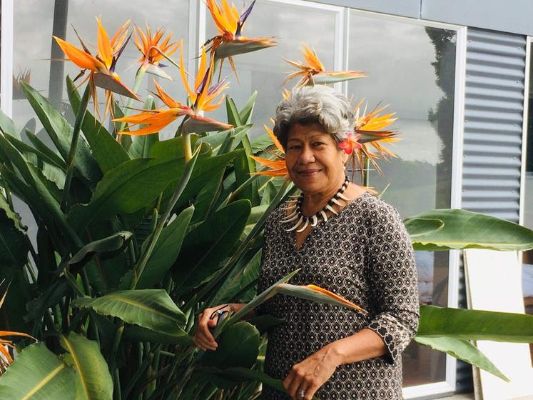A Message To Our Nurses In 2020

Nurses globally and in Aotearoa New Zealand are at the forefront of care this year as we celebrate the International year of the Nurse. It’s International Nurses Day on Tuesday 12 May and the 200th birthday of Florence Nightingale, whose influence on modern nursing will always be remembered.
Our nurses have never been under more pressure here and across the Pacific. This year we are celebrating and acknowledging these quiet heroes who are always wanted where they are needed, but never more so than during a pandemic.
Leaupepe Peta Karalus has a relentless passion for healthcare in her community which started when she arrived in New Zealand from Western Samoa in the 70s as a very homesick 17-year old after being awarded a scholarship to study nursing. At the time, she just wanted to go home.
Decades after starting her nursing training, Karalus, a well-known Pasifika leader, has nursed here and in her home country, continued her education and has been instrumental in teaching hundreds of nurses at Wintec.
This Wintec Honorary Fellowship recipient has never stopped being an advocate for nurses, their education and the health and wellbeing of Pasifika people.
Based now in Samoa, she is unexpectedly here in New Zealand with her family during the COVID-19 lockdown and she has a strong message for today’s nurses and nursing students.
Advertisement - scroll to continue reading“Nursing, and in fact all of healthcare is changing rapidly and COVID-19 has intensified and highlighted the big needs. Do we have the ability and the kindness to care for more people? Do we have the openness to know more? We need to reflect on what is needed to continue a high standard of evidence-based care. But what is needed most is more dedicated, highly trained people - we need more nurses.”
Karalus is also the founder of K’aute Pasifika which has grown to support the health and wellbeing of more than 4,000 Pacifika people around Hamilton. It is now led by her daughter Leaupepe Rachel Karalus. She says that healthcare and support has never been more important and there’s demand for more Pasifika and Māori nurses to support their communities as they continue to be under-represented in healthcare.
“The first step for our future nurses is to apply. Then aim high, it’s good to qualify but think further to post-graduate level. The more highly qualified nurses we have from our community, the better influence they will have.
“Nurses are people who want to care for others and relieve suffering, and nursing is a rich and very rewarding vocation with opportunities galore. As a New Zealand registered nurse, you can work anywhere.”
As the world celebrates 2020 as the Year of the Nurse, Wintec celebrates 42 years delivering pre-registration nursing education and 19 years in the delivery of post-graduate nursing programmes.
Wintec Chief Executive, David Christiansen says that Wintec’s longevity in delivering high quality nursing training is only getting stronger.
“Wintec has been at the heart of nursing education in the Midlands Health region for more than 40 years. Our investment in encouraging and guiding tomorrow’s nurses is ongoing and we are successful because of our strong partnerships with health leaders and our approach to supporting our learners.”
Wintec is committed to producing nursing graduates who are bicultural partners, responsive to the aspirations of mana whenua (responding to and respecting Māori tribal communities) and Te Tiriti o Waitangi (The Treaty of Waitangi) principles.
Wintec Centre for Health and Social Practice, Director, Professor Sharon Brownie and nursing team managers, Helen Nielsen and Glennis Birks lead a dedicated teaching team at Wintec. putting cultural responsiveness at the heart of nursing practice.
“We are proud of our nursing graduates who provide professional, compassionate and culturally responsive nursing care within a variety of health care settings including rural, remote and Māori and Pasifika contexts. They hold the promise of being agents of change committed to the reduction of health disparities within the communities they work in,” Professor Brownie says.
Florence Nightingale would no doubt, be very proud of our nurses today.


 Tertiary Education Union: Weltec And Whitireia Cuts A Shocking Blow For Their Communities
Tertiary Education Union: Weltec And Whitireia Cuts A Shocking Blow For Their Communities PHARMAC: Pharmac Proposes To Fully Fund Nutrition Replacements For Some People With Crohn’s Disease
PHARMAC: Pharmac Proposes To Fully Fund Nutrition Replacements For Some People With Crohn’s Disease Nōku Te Ao: Bringing Together Voices On Mental Distress, Stigma And Discrimination Under One Roof
Nōku Te Ao: Bringing Together Voices On Mental Distress, Stigma And Discrimination Under One Roof Office of Early Childhood Education: Early Childhood Education Sector Confidence Survey Results 2025
Office of Early Childhood Education: Early Childhood Education Sector Confidence Survey Results 2025 Bikesport NZ: Intrepid Kiwi Teen Ready To Accept New Challenge
Bikesport NZ: Intrepid Kiwi Teen Ready To Accept New Challenge Wellington Access Radio: Young People Take Over Wellington Access Radio For Youth Broadcasting Week 2025
Wellington Access Radio: Young People Take Over Wellington Access Radio For Youth Broadcasting Week 2025